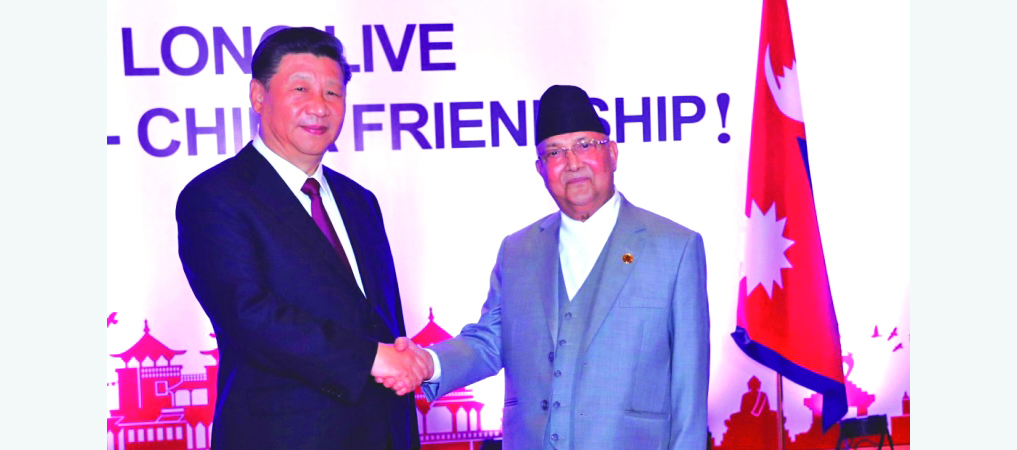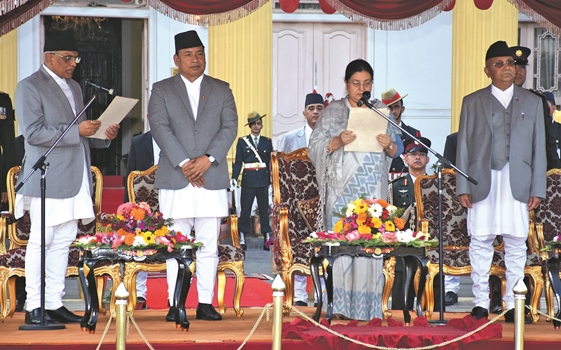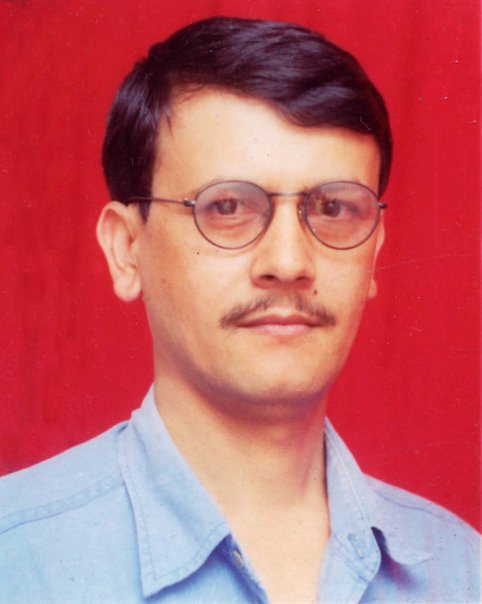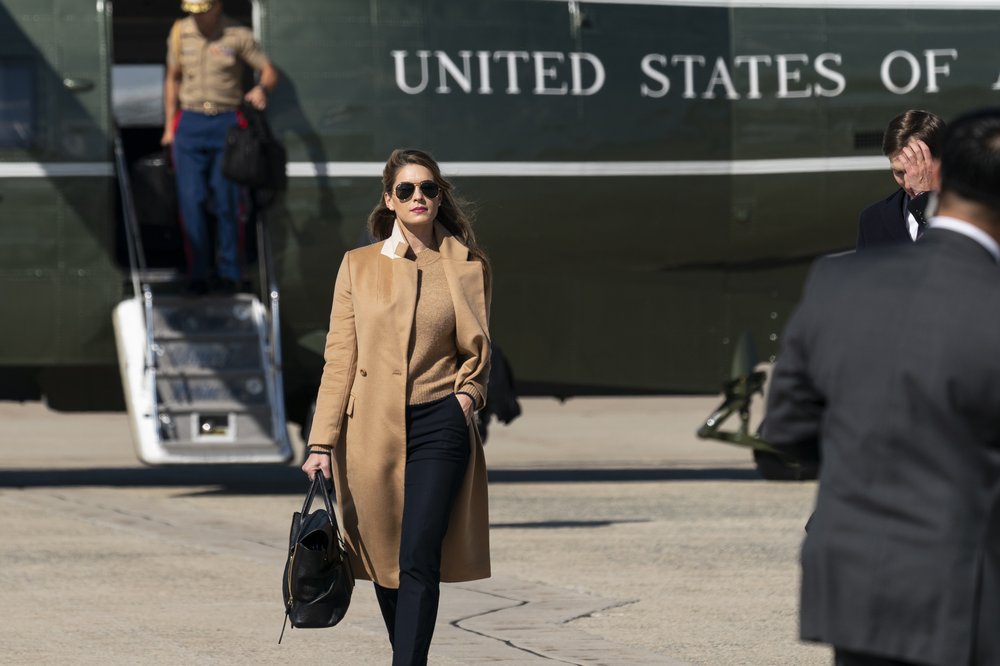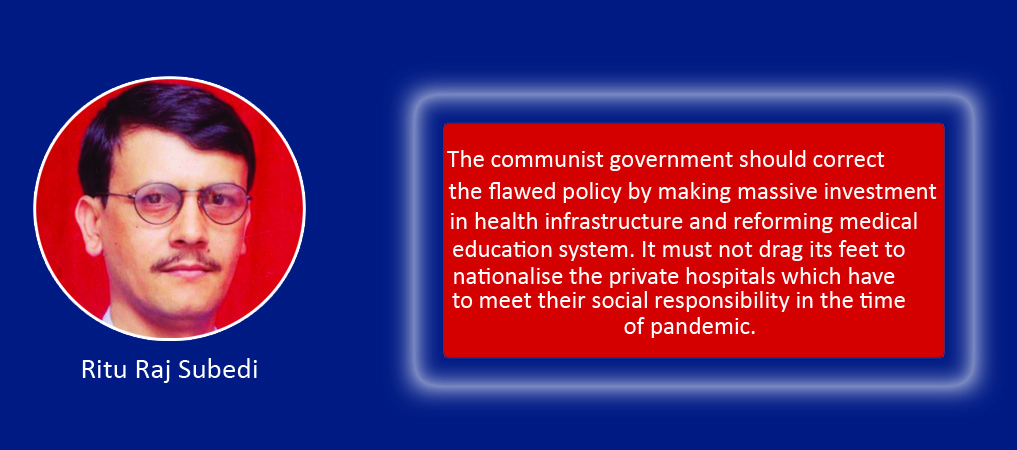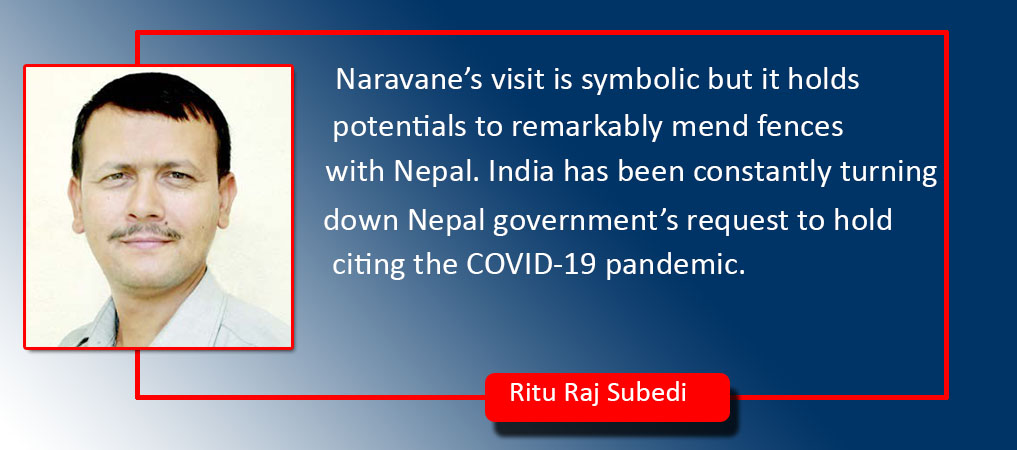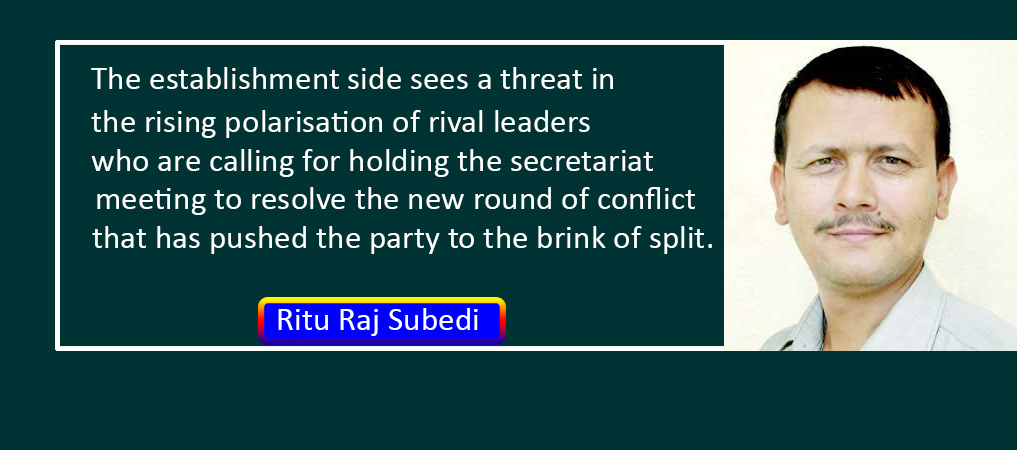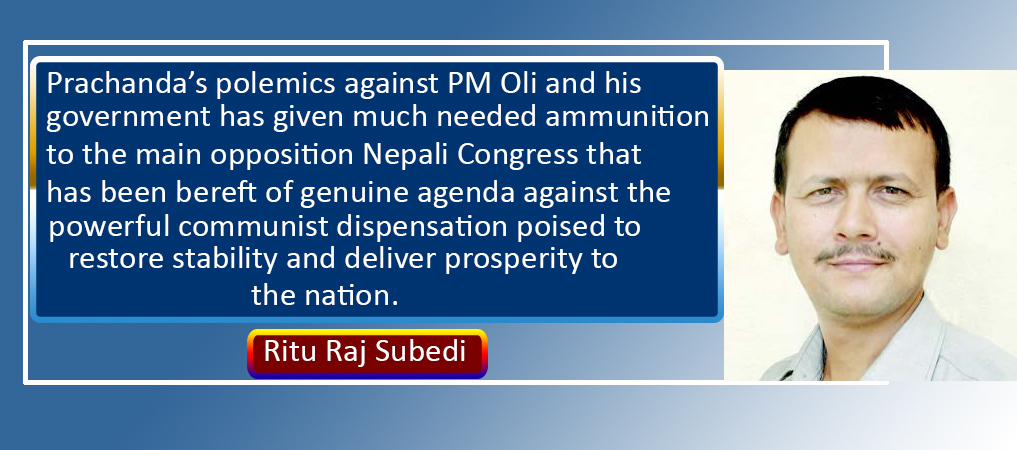Melodramatic Moves Fuel NCP Rift

Ritu Raj Subedi
AS the country’s executive head, Prime Minister KP Sharma Oli is now facing triple crises. First and foremost, he is confronting severe leadership challenges from his rival comrades within the ruling party. This serious political trouble is the direct result of failure of collective leadership in the party and entails wider ramification for the country. Second crisis is posed by the opposition Nepali Congress (NC) that has come out of long hibernation, trying to expose the communist government’s ‘inefficiency’ in handling the affairs of the state. The third crisis is anti-systemic spearheaded by royalist forces. The pro-monarchists have demanded the restoration of kingship and Hindu state, questioning the rationale of republican set-up, secularism and federal order. They demand a referendum to gauge popular sentiments over these issues.
The raging intra-party conflict is blamed for the emergence of other two crises because it has exacted a toll on the government’s overall performance, providing much ammunition to both constitutional and extra-constitutional elements which nurture clear anathema to the powerful left administration mandated to carry out sweeping socio-economic transformation in the 2017 historic three-tier elections. The ruling party leaders have forgotten their electoral promise and indulged in the futile squabble only to render the new constitution and federal order fragile and dysfunctional.
Zigzag course
The bickering within the NCP is trundling through a zigzag course. Sometime it hits a climatic point, giving an impression that no force can stop its immediate split. The other time, the leaders stage a high-voltage drama that quickly ends in a temporary compromise, offering much-needed respite to the edgy party cadres. The latest episode is related to the ordinance that amends structure and functions of the Constitutional Council (CC). But the move in no time triggered nasty reaction. Oli’s nemeses immediately collected the signatures of 83 lawmakers and went to the Office of the President, demanding the special session of parliament. But both sides backed down and agreed to withdraw both the ordinance and application for the house session.
However, there is no sign that the warring factions have come to mutual consensus to resolve the ongoing tussle. The government is yet to formally withdraw the ordinance which was brought to make the CC’s business more flexible and efficient. The six-member CC’s structure manifests a unique combination of executive, legislature and judiciary so as to check and balance state’s powers, the key ingredient of democracy. But in Nepal, the political parties have been unable to live up to this core value of democratic polity. The politics of bhag-banda (divide and share) has marred the elements of impartiality, meritocracy and equilibrium in the vital organs of the state. The partisan politics has made the mockery of such grand constitutional arrangement. Nepal is perhaps only a country where the opposition seeks its share in the major constitutional appointments. Such a lust for power only divests it of moral fibre essential to play a constructive role in the parliament.
Not only this, even factional groups within the ruling party stake their claims to the important positions in constitutional bodies, which can tip the balance in favour or against any leader and political party. So the leaders want to fill the constitutional bodies with their loyalists in order to secure their political fortune and future. This tussle of vested interest is one reason why the CC has become the hostage of indecision. Many positions in various constitutional bodies have been lying vacant for more than two years. The PM argues that he brought the ordinance to end deadlock and delay in the appointment to the constitutional wings.
The ordinance allows the CC to make decisions even if there are only three members present. Constitutionally, the PM has the right to unveil the new ordinance to amend the existing provisions related to the functions and procedures of the CC but the move has come under greater constitutional, political and ethical scrutiny. Questions have been raised against it from court to the streets. Critics insist the ordinance gives undue leeway to the PM to demonstrate authoritarian character. While the Prachanda-Nepal faction is not still assured of the withdrawal of the ordinance, PM Oli is apparently afraid of whether the former will move to the extent of registering a no-confidence motion against him in the parliament.
Factional meetings
Emboldened by the support of growing number of lawmakers as demonstrated by the collection of 83 lawmakers, the Prachanda-Nepal faction is engaged in organising the meetings of their state-level party office-bearers and leaders. Such an activity will further widen the rift and ultimately pave the way for the vertical division of the party. The ongoing party-government conflict is not new in the country’s political history. Nepali politics has become the victim of such wrangling that has made every new installed system unstable, putting the pressing socio-economic agenda on the back burner.
The second-rung leaders within the party are pulling their weight to find a middle ground. One viable option they are exploring is the withdrawal of the political documents of both chairmen and presenting their joint document at the Standing Committee meeting but the Prachanda-Nepal faction is firm on settling the current dispute through the committee-level decisions based on majoritarian method, an idea that the PM strongly abhors because he has understood that this is the strategy of his opponents to oust him from one of two posts.
(Deputy Executive Editor of The Rising Nepal, Subedi writes regularly on politics, foreign affairs and other contemporary issues)
Recent News

Do not make expressions casting dout on election: EC
14 Apr, 2022
CM Bhatta says may New Year 2079 BS inspire positive thinking
14 Apr, 2022
Three new cases, 44 recoveries in 24 hours
14 Apr, 2022
689 climbers of 84 teams so far acquire permits for climbing various peaks this spring season
14 Apr, 2022
How the rising cost of living crisis is impacting Nepal
14 Apr, 2022
US military confirms an interstellar meteor collided with Earth
14 Apr, 2022
Valneva Covid vaccine approved for use in UK
14 Apr, 2022
Chair Prachanda highlights need of unity among Maoist, Communist forces
14 Apr, 2022
Ranbir Kapoor and Alia Bhatt: Bollywood toasts star couple on wedding
14 Apr, 2022
President Bhandari confers decorations (Photo Feature)
14 Apr, 2022



